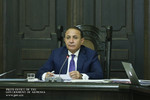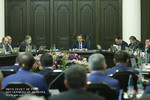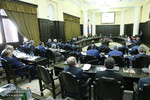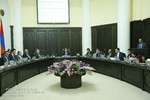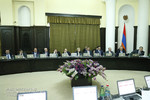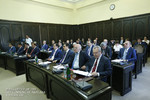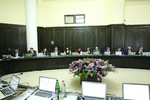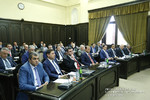Thursday, 2 June 2016
Equal conditions for all businesses - Prime Minister issues relevant instructions
Prime Minister Hovik Abrahamyan.
Before proceeding to the agenda, the Prime Minister made a statement: “On May 12, 2016, I instructed the Ministry of Economy and the State Commission for Protection of Economic Competition to explore the situation with monopolies in the country, find out their impact on the level playing field and submit relevant proposals.
The conclusions we drew in the wake of several consultations held with the stakeholders are as follows: while the key staple markets of social importance, including sugar, flour, wheat, oil, rice, buckwheat, butter, margarine, banana, orange, baby food, poultry, medicines, gasoline and diesel fuel, are not formally monopolies, however, they are perceived as such by the public at large.
The reason is that these commodity markets are highly centralized, which leads to risks such as impaired competition and motivation, narrow market access for SME and startups, violations of consumer rights, corruption and, finally, unjustified market price fluctuations that can eventually lead to economic handicap.
In general, any commodity market can be subject to centralization due to specific or most common reasons, which should be the primary focus of our efforts. We will start with the socially important commodity markets, but we are not going to stop there.
I instruct the Minister of Economy to develop clear and detailed guidelines on import-related procedures within a month’s time.
They must include all the necessary documents, expert examinations, certificates, payments, deadlines, authorities, appeal procedures etc. The guidelines should be available on the official websites of the Ministry of Economy, Ministry of Finance, the SRC and all related departments. The guidelines must be available in English and Russian within two months.
Also, I instruct Minister-Chief of Government Staff David Haroutunyan to introduce a hotline service within a month’s time in order to receive complaints regarding the problems and respond to them quickly. The Prime Minister's Control Service will be responsible for control of hotline calls. Information shall be made available on a monthly basis regarding the calls received and follow-up action. Upon receipt of information to that effect, public authorities will have to immediately notify the Government Staff.
I instruct the Head of the State Revenue Committee and the Prime Minister’s Control Service to submit monthly reports starting from this August 1 as to whether importers have enjoyed identical approaches during customs formalities,
Here, the focus should be to ensure equal conditions for all businesses, and any unjustified deviation should be the subject to service probe. The necessary methodology and mechanisms should be developed within a month’s time for monitoring purposes.
In order to find a systemic solution to the problem at hand, I am urging the Ministry of Economy and the State Revenue Committee to discuss within two months and submit a concept note on the regulations to apply all the way through the import-wholesale-retail chain to prevent large companies from dictating the rules of market game.
Specifically, I suggest considering the idea of preventing large enterprises from getting simultaneously engaged in retail and wholesale trade on the market of socially important commodities. In that case, wholesale entities should operate through State-controlled electronic platforms, where the sale conditions shall be transparent and equitable for all buyers. Even if importers and retailers appear to be affiliated companies, they will have to act through this platform.
I give the National Center for Legislative Regulation Foundation 3 months to examine the import-related procedures in cooperation with all relevant departments and submit recommendations on possible simplifications. In particular, the Center should discuss the possibility of expanding the scope of self-declaration, buying different services from laboratories and SNCOs and minimizing the requirements for certificate provision. Deputy Prime Minister Vache Gabrielyan shall be responsible for the monitoring of these processes.”
The Government amended the corresponding decision of February 10, 2011 “On testing a new system of air ticket purchases and procurements.” The amendment seeks to create a legal basis for the purpose of organizing the procurement of aviation services at the expense of budget funds for the implementation of pilot testing of electronic systems with Amadeus Company.
The meeting approved the proposal to sign an agreement on visa-free trips of citizens between the Government of the Republic of Armenia and the Government of the Islamic Republic. The agreement is supposed to promote bilateral relationship between Armenia and Iran, build up mutually beneficial economic, commercial and other ties between the two countries. The agreement aims to regulate the regime of mutual trips of citizens of both countries.
The meeting next endorsed the proposal to sign an arrangement on air communications between the Government of the Republic of Armenia and the Government of the People’s Republic of China. After revision, the Agreement will help modernize and streamline relations in the field of air services between the two countries, liberalize the aviation sector and create favorable conditions for maintenance of routes for airlines and vice versa.
The Government also approved the visa facilitation agreement between the Republic of Armenia and the Swiss Confederation as signed on February 29, 2016, which aims to facilitate the issuance of visas to citizens of Armenia for no more than 90 days during a 180-day period of stay in Switzerland.







